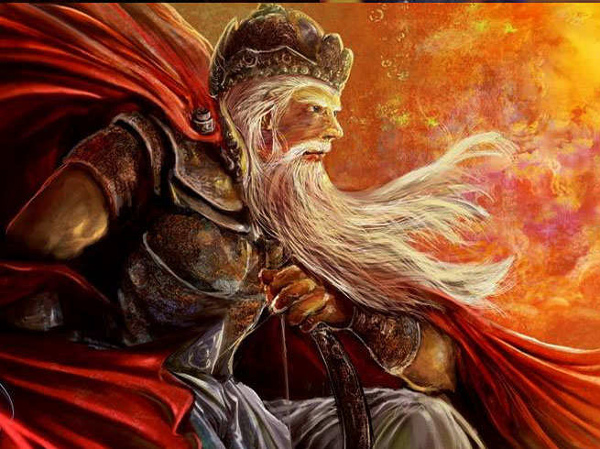Bhishma was not only grandfather of both Pandavas and Kauravas, but was also the war chief of Kauravas. He, in the battle of Mahabhratha represents the highly logical human intellect.
Bhishma – The Terrible
Bhishma, the name itself, signifies great sacrifice of a great warrior.He symbolizes that when taking responsibilities, human bondage has little importance and dharma has to be given the highest priority.
He is the son of king Shantanu and Goddess Ganga. Hie real name was Devavrata. He received his learning from the Parashurama.
Devavrata took a vow to remain a celibate to please his father’s non-royal second wife, to give way for her progeny to rule the land, he was to have been the king in place of Pandu or his brother Dhritarashtra.S till, Bhishma remained the clan’s prime warrior, teacher of martial arts and the grand-master. It is because of this terrible vow that he became known as BHISHMA, which means “Terrible”.
Bhishma was one one of the greatest devotees of Lord Krishna. During the battle of Mahabharatha, He was always aware of the futility of fighting on the side of the Kauravas against the Pandavas who had the Dharma as well as divine strategist Krishna on their side. He like many enlightened warriors understood that the Pandavas could not win until he sacrificed his life because Bhishma who was aware of the divinity of Sri Krishna knew the futility of humans fighting against Dharma.
Bhishma’s Sermon on Statescraft
Bhishma was given a boon of “Icha Mrutyu“(A boon to choose the time of death) by his father. During the final battle of Mahabhartha, grievously wounded Bhishma was on a bed of arrows. He held his breathe, because of the boon (Icha Mrutyu); it was then that Bhishma gave the sermon on Raja Niti (Statescraft)
Bhishma’s 36-Point Manifesto for kings (Raja Niti)
- A king should observe his duties without wrath or malice.
- He should not disregard kindness.
- He should have faith.
- He should acquire wealth without oppression and wickedness.
- He should pursue pleasure without attachment.
- He should with cheerfulness, utter what is agreeable, and be brave without brag.
- He should be liberal, but should not make gifts to persons that are undeserving.
- He should accomplish objectives without cruelty.
- He should make alliance, avoiding those that are wicked.
- He should not act with hostility towards friends.
- He should never employ persons not devoted to him as his spies and secret agents.
- He should never obtain his objects by persecution.
- He should never disclose his purposes before persons that are wicked.
- He should speak of the merits of others but never his own.
- He should take wealth from his subjects but never from those that are good.
- He should never employ or take the assistance of persons that are wicked.
- He should never inflict punishment without careful inquiry.
- He should never disclose his counsels.
- He should give away, but not to persons that are covetous.
- He should repose confidence on others but never on those that have injured him.
- He should not cherish malice.
- He should protect his wedded wives.
- He should be pure and should not always be melted by compassion.
- He should not indulge much in female companionship.
- He should take food that is wholesome and never that which is otherwise.
- He should without pride pay regards to those that deserve them, and serve his preceptors and seniors with sincerity.
- He should worship the Gods without pride.
- He should seek prosperity, but never do anything that brings infamy.
- He should wait (upon his seniors) with humility.
- He should be clever in business but should wait for the proper time.
- He should comfort men and never send them away with empty speeches.
- Having favored a person he should not abandon him.
- He should never strike in ignorance.
- Having slain his foe, he should never indulge in sorrow.
- He should display temper, but should never do so when there is no occasion.
- He should be mild but never to those that have offended.
The self-explanatory Raja Niti for kings, from Bhishma is applicable to modern leaders of the boardrooms and legislatures too. It presents reality and the factors contributing to one’s personality development covering duties and responsibilities.
Author: Sorcerer
Image Courtesy: Navbharath Times
You may also like
-
Navigating India’s Skill Landscape
-
IAF Aircraft Set Course For Exercise Eastern Bridge VII At Oman
-
India-us Working Together In Areas Like Critical Minerals, Supply Chains And Advanced Technologies: Shri Piyush Goyal
-
IIFT Tops Worldwide in LinkedIn Global MBA Ranking 2024 in Networking, Holds 51st Position Among Top 100 Programmes
-
Defence Secretary to co-chair 5th India-Philippines Joint Defence Cooperation Committee meeting in Manila
